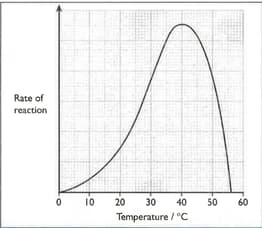Mary Jones and Geoff Jones Solutions for Chapter: Enzymes, Exercise 2: Questions
Author:Mary Jones & Geoff Jones
Mary Jones Biology Solutions for Exercise - Mary Jones and Geoff Jones Solutions for Chapter: Enzymes, Exercise 2: Questions
Attempt the practice questions on Chapter 5: Enzymes, Exercise 2: Questions with hints and solutions to strengthen your understanding. Cambridge IGCSE® Biology Coursebook Third Edition solutions are prepared by Experienced Embibe Experts.
Questions from Mary Jones and Geoff Jones Solutions for Chapter: Enzymes, Exercise 2: Questions with Hints & Solutions
MEDIUM
Upper Secondary: IGCSE
IMPORTANT
What is meant by an optimum temperature?
HARD
Upper Secondary: IGCSE
IMPORTANT
What is the optimum temperature for the enzyme in given figure?

MEDIUM
Upper Secondary: IGCSE
IMPORTANT
Why are the enzymes damage by high temperature?
